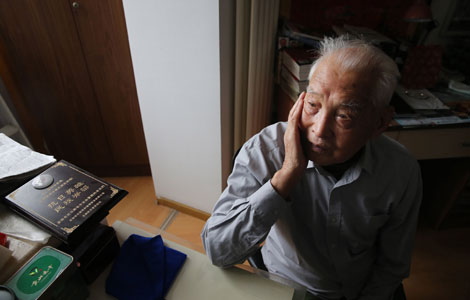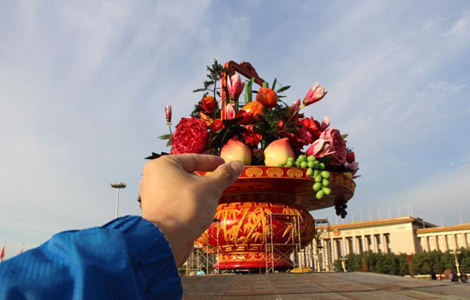'House sister' denies charge of faking ID
Updated: 2013-09-24 19:31
(Xinhua)
|
||||||||
XI'AN - A woman suspected of owning multiple properties under forged identities denied the charges against her at a court in northwest China's Shaanxi Province on Tuesday.
Gong Aiai, whose alleged activities have earned her the nickname "House Sister" in China, was charged with forging and trading official documents at the trial at the People's Court of Jingbian County.
The prosecution alleged that Gong, former deputy head of the Shenmu County Rural Commercial Bank in Yulin City, spent 300,000 yuan (48,780 U.S. dollars) to purchase two household registration IDs for herself and her daughter in 2005 in order to buy houses in Beijing.
The 49-year-old woman allegedly forged two ID cards under the names Gong Xianxia and Gong Aiai in 2007 and 2008, respectively.
Gong, a native of Shenmu County, argued that she was unaware that it is illegal to possess multiple hukou IDs, a household registration record unique to each Chinese citizen, but she apologized that her behavior has led to negative social effects.
The trial closed at around 11:10 a.m. and the verdict will be delivered at a later date. The prosecution suggested that Gong be sentenced to 2.5 or three years in jail.
In January, online whistleblowers revealed that Gong, who later became known as "House Sister" among the public, held more than 20 Beijing properties worth an estimated 1 billion yuan under the names Gong Aiai and Gong Xianxia.
She was later found to have acquired properties in other areas, including Shenmu.
Investigations found that Gong was a contracted bank employee, but not a civil servant. She tendered her resignation as deputy head of the bank in June 2012, and the board approved her resignation request on Jan. 2, 2013.
According to the police, Gong has four hukou IDs and possesses 44 Beijing properties with total floor space of 10,543 square meters. The total property value amounted to 395 million yuan.
While Internet users questioned whether the money Gong used to buy property was earned legally, police said they have not received reports that Gong was involved in illegal fundraising, absorption of public deposits, or contract fraud.
Gong said in court that she earned money mainly through the coal business and has borrowed money from friends. She claimed that all her possessions were gained through legal means.
 |
|
Gong Aiai, suspected of owning multiple properties under false identities, stands trial in Yulin city, Northwest China's Shaanxi province, Sept 24, 2013. [Photo/CFP] |
Experts said the case shows that it is time for the government to deal with the loopholes in China's household registration system.
"Some citizens may take advantage of system loopholes and have two hukou IDs, two ID cards, or even have the same ID number as another person," said Chen Bo, associate researcher with the Shaanxi Academy of Social Sciences.
Chen said strengthened police supervision and more severe punishments are required.
A Beijing police officer surnamed Wang said police cannot possibly fix all the loopholes.
"Some Beijing university students went back to their hometowns after graduation and requested a local ID card without canceling the one they requested in Beijing when they first came to the capital. Thus, they have two valid ID cards legally," said Wang.
She added that residents only need to report to local police stations after they lose their ID cards, fill out an application, present their hukou, and they will be issued new cards.
"There's no way for police to verify if they really lost their ID cards or not," said Wang, adding that in this way people can acquire multiple valid ID cards.
China started issuing ID cards in 1984 and the country is now accelerating work to record residents' fingerprints on second-generation ID cards to prevent forgery and fraud.
Experts said the country still has a long way to go to improve its household registration information management system.
"Advanced technologies should be introduced to the management system," said Hong Daode, law professor with China University of Political Science and Law.
"Resident identity registration systems in different provinces should be connected with one another so that police can learn information from across the nation," said Wang.
Most Viewed
Editor's Picks

|

|

|

|

|

|
Today's Top News
BlackBerry agrees to bid to go private
FM: China opposes all forms of terrorism
Microsoft shifts tablet plans for China
GSK's China sales may be down 30% on scandal
China to help deal with chemical weapons
China, Africa 'share destiny'
Maryland, Xi'an seek new link
Trending news across China
US Weekly

|

|














